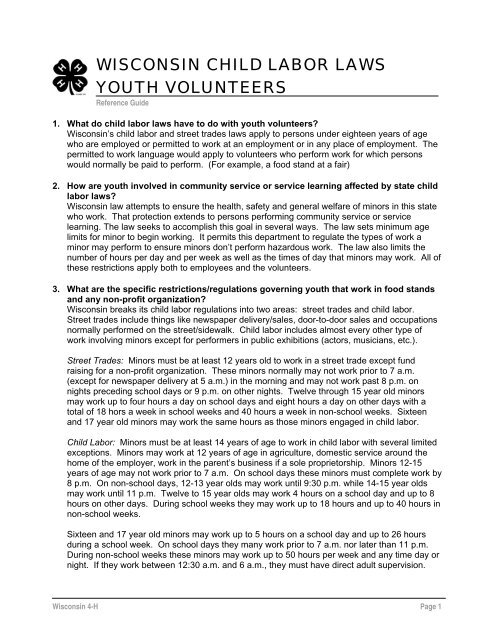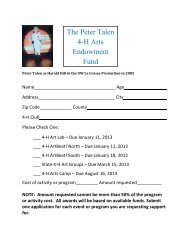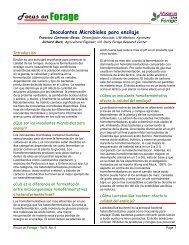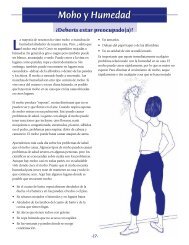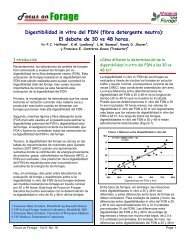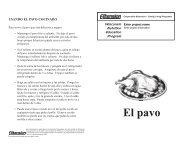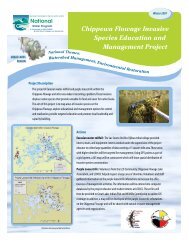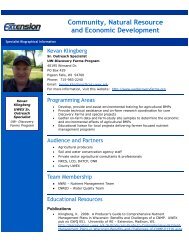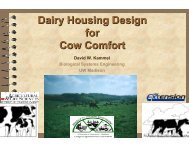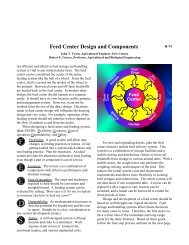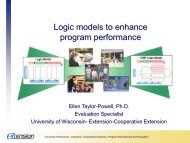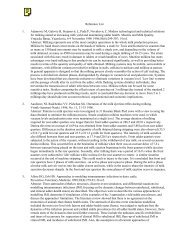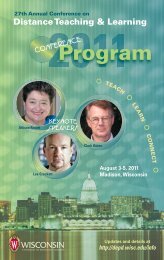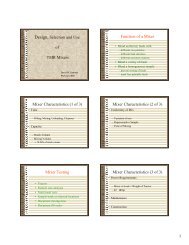wisconsin child labor laws youth volunteers - University of Wisconsin ...
wisconsin child labor laws youth volunteers - University of Wisconsin ...
wisconsin child labor laws youth volunteers - University of Wisconsin ...
Create successful ePaper yourself
Turn your PDF publications into a flip-book with our unique Google optimized e-Paper software.
WISCONSIN CHILD LABOR LAWS<br />
YOUTH VOLUNTEERS<br />
Reference Guide<br />
1. What do <strong>child</strong> <strong>labor</strong> <strong>laws</strong> have to do with <strong>youth</strong> <strong>volunteers</strong>?<br />
<strong>Wisconsin</strong>’s <strong>child</strong> <strong>labor</strong> and street trades <strong>laws</strong> apply to persons under eighteen years <strong>of</strong> age<br />
who are employed or permitted to work at an employment or in any place <strong>of</strong> employment. The<br />
permitted to work language would apply to <strong>volunteers</strong> who perform work for which persons<br />
would normally be paid to perform. (For example, a food stand at a fair)<br />
2. How are <strong>youth</strong> involved in community service or service learning affected by state <strong>child</strong><br />
<strong>labor</strong> <strong>laws</strong>?<br />
<strong>Wisconsin</strong> law attempts to ensure the health, safety and general welfare <strong>of</strong> minors in this state<br />
who work. That protection extends to persons performing community service or service<br />
learning. The law seeks to accomplish this goal in several ways. The law sets minimum age<br />
limits for minor to begin working. It permits this department to regulate the types <strong>of</strong> work a<br />
minor may perform to ensure minors don’t perform hazardous work. The law also limits the<br />
number <strong>of</strong> hours per day and per week as well as the times <strong>of</strong> day that minors may work. All <strong>of</strong><br />
these restrictions apply both to employees and the <strong>volunteers</strong>.<br />
3. What are the specific restrictions/regulations governing <strong>youth</strong> that work in food stands<br />
and any non-pr<strong>of</strong>it organization?<br />
<strong>Wisconsin</strong> breaks its <strong>child</strong> <strong>labor</strong> regulations into two areas: street trades and <strong>child</strong> <strong>labor</strong>.<br />
Street trades include things like newspaper delivery/sales, door-to-door sales and occupations<br />
normally performed on the street/sidewalk. Child <strong>labor</strong> includes almost every other type <strong>of</strong><br />
work involving minors except for performers in public exhibitions (actors, musicians, etc.).<br />
Street Trades: Minors must be at least 12 years old to work in a street trade except fund<br />
raising for a non-pr<strong>of</strong>it organization. These minors normally may not work prior to 7 a.m.<br />
(except for newspaper delivery at 5 a.m.) in the morning and may not work past 8 p.m. on<br />
nights preceding school days or 9 p.m. on other nights. Twelve through 15 year old minors<br />
may work up to four hours a day on school days and eight hours a day on other days with a<br />
total <strong>of</strong> 18 hors a week in school weeks and 40 hours a week in non-school weeks. Sixteen<br />
and 17 year old minors may work the same hours as those minors engaged in <strong>child</strong> <strong>labor</strong>.<br />
Child Labor: Minors must be at least 14 years <strong>of</strong> age to work in <strong>child</strong> <strong>labor</strong> with several limited<br />
exceptions. Minors may work at 12 years <strong>of</strong> age in agriculture, domestic service around the<br />
home <strong>of</strong> the employer, work in the parent’s business if a sole proprietorship. Minors 12-15<br />
years <strong>of</strong> age may not work prior to 7 a.m. On school days these minors must complete work by<br />
8 p.m. On non-school days, 12-13 year olds may work until 9:30 p.m. while 14-15 year olds<br />
may work until 11 p.m. Twelve to 15 year olds may work 4 hours on a school day and up to 8<br />
hours on other days. During school weeks they may work up to 18 hours and up to 40 hours in<br />
non-school weeks.<br />
Sixteen and 17 year old minors may work up to 5 hours on a school day and up to 26 hours<br />
during a school week. On school days they many work prior to 7 a.m. nor later than 11 p.m.<br />
During non-school weeks these minors may work up to 50 hours per week and any time day or<br />
night. If they work between 12:30 a.m. and 6 a.m., they must have direct adult supervision.<br />
<strong>Wisconsin</strong> 4-H Page 1
The department also regulates the types <strong>of</strong> work that minors perform. The regulations<br />
contained in DWD 270.06 Hazardous Employments. This section <strong>of</strong> the rules attempts to list<br />
those specific types <strong>of</strong> machines, work sites or activities that present a hazard to minors <strong>of</strong><br />
various ages.<br />
4. What age must a minor be to work as a volunteer at a food stand at a fair, church festival<br />
or street carnival for non-pr<strong>of</strong>it organizations like 4-H, scouts, or a church group?<br />
The answer to this question depends upon whether the stand represents a street trade or a<br />
<strong>child</strong> <strong>labor</strong> situation. If a stand is in a permanent or semi-permanent location at the fair, for<br />
example, it would fall under the <strong>child</strong> <strong>labor</strong> regulations. Let’s say the non-pr<strong>of</strong>it group leases<br />
the concession/kitchen area in a building at the fairgrounds. This clearly would be <strong>child</strong> <strong>labor</strong>.<br />
Minors working in this stand need to be at least 14 years <strong>of</strong> age.<br />
If a stand is movable stand located on the fair grounds, at a carnival or a church festival, it<br />
would fall under the heading <strong>of</strong> street trade. The grounds represent a public site. Minors<br />
working in this stand need to be at least 12 years <strong>of</strong> age.<br />
[Please see letter from Robert Anderson dated April 12, 1999 for clarification <strong>of</strong> this question in<br />
regards to those stands that are located on public grounds. This letter is attached to this<br />
document]<br />
5. In a street trade type food stand, what types <strong>of</strong> work may a twelve or thirteen year old<br />
may perform?<br />
These minors may wait on customers, cashier, clean tables and wash dishes. They can serve<br />
non-alcoholic beverages from c<strong>of</strong>fee urns, soda machines, or soda hoses. They can do food<br />
preparation such as assemble sandwiches, remove food from warmers or put ingredients<br />
together. They may not cook food <strong>of</strong> any type, operate any power equipment (including a<br />
microwave oven) or operate any cutting slicing type <strong>of</strong> machinery. Under no circumstances<br />
may any minor serve, sell, or handle alcoholic beverages.<br />
Volunteers are encouraged to review the products sold and operating procedures to develop<br />
policies in food stands to keep <strong>youth</strong> safe and to make foods sales a fun, educational<br />
experience. A strong adult to <strong>youth</strong> ratio for <strong>volunteers</strong> in food stands further insure safety and<br />
the educational value <strong>of</strong> these activities for <strong>youth</strong>.<br />
6. Do <strong>youth</strong> who volunteer need a permit?<br />
No<br />
7. How are <strong>youth</strong> involved in fund raising affected by <strong>child</strong> <strong>labor</strong> <strong>laws</strong>?<br />
The <strong>child</strong> <strong>labor</strong> and street regulations apply to these individuals with one exception. Individuals<br />
engaged in door-to-door sales for the purpose <strong>of</strong> fund raising for a non-pr<strong>of</strong>it organization may<br />
perform this work at any age. Minors under nine years <strong>of</strong> age must be accompanied by an<br />
individual sixteen years <strong>of</strong> age while on the street.<br />
8. How do the <strong>child</strong> <strong>labor</strong> and street trades <strong>laws</strong> impact upon the following activities <strong>of</strong> a<br />
community service nature?<br />
Leaf Raking: Volunteering to rake leaves for a neighbor, elderly or disabled person falls under<br />
the heading <strong>of</strong> domestic work around the home <strong>of</strong> the employer. The minor may be 12 years <strong>of</strong><br />
age to perform this work. As long as they use only hand rakes the work would be okay. In<br />
order to use a power vacuum or blower, the minor would need to be 16 years <strong>of</strong> age.<br />
<strong>Wisconsin</strong> 4-H Page 2
Roadside clean-up: A 12 year old minor may volunteer to perform this work since it constitutes<br />
a street trade.<br />
Performing in a nursing home: By performing, I assume you mean acting, singing, playing a<br />
musical instrument or doing some type <strong>of</strong> performing <strong>of</strong> that nature. These activities fall under<br />
the heading <strong>of</strong> a public exhibition. A minor <strong>of</strong> any age may engage in these activities.<br />
If “performing” means working at the nursing home cleaning or performing other duties in the<br />
nursing home, the minimum age would be 14 years <strong>of</strong> age. Beyond the age limit, however, no<br />
minor may volunteer to work for free to perform work that normally would be performed by a<br />
paid employee.<br />
Playing BINGO with senior citizens: I would consider this to be a public exhibition since the<br />
principal purpose is to entertain the seniors. Minors <strong>of</strong> any age could perform this activity.<br />
9. What specific regulations apply to minors volunteering to work in agricultural types <strong>of</strong><br />
jobs?<br />
First <strong>of</strong> all, let’s distinguish between agricultural types <strong>of</strong> jobs and agriculture. Driving a tractor<br />
on a farm is agriculture. Driving a tractor for a landscaping business isn’t agriculture but might<br />
be consider an agricultural type <strong>of</strong> job. Persons performing agricultural work must be at least<br />
12 years <strong>of</strong> age and may work unlimited hours during peak seasons. By contrast, agricultural<br />
type employments fall under the regular <strong>child</strong> <strong>labor</strong> regulations. That would mean a minor must<br />
be 14 years <strong>of</strong> age.<br />
10. How are potential violations reported and investigated?<br />
Anyone may file a complaint with the department alleging a business, organization or private<br />
individual may have violated state <strong>child</strong> <strong>labor</strong>, street trades or public exhibitions <strong>laws</strong>. The<br />
Labor Standards Bureau within the department then would assign an investigator to gather<br />
information concerning the allegation, document any violations and seek compliance. Seeking<br />
compliance may involve seek voluntary compliance or it may involve litigation to assess<br />
statutory penalties for violation <strong>of</strong> the law. Individuals who permit minors to work in violation <strong>of</strong><br />
the law may be fined up to $5,000 for each violation. Each day each minor is permitted to work<br />
in violation <strong>of</strong> the statute represents a separate violation.<br />
11. How can <strong>youth</strong> or adults impact and provide input legislation on <strong>youth</strong> volunteerism?<br />
People need to communicate their concerns to their elected state representative or state<br />
senator. Legislators like to tell an old joke that has a lot <strong>of</strong> truth in it. If one person contacts a<br />
legislator about a perceived problem, the legislator listens but doesn’t get to excited about it. If<br />
two people contact a legislator about the same problem, it becomes a problem to the legislator.<br />
If several people contact a legislator about a problem, that issue becomes a crisis in the<br />
legislator’s view. You decide what is important to your legislator. If you aren’t satisfied with the<br />
way the current <strong>laws</strong> deal with the use <strong>of</strong> <strong>youth</strong> <strong>volunteers</strong>, you need to communicate your<br />
concerns to your elected representatives.<br />
When you contact your representative, be positive. State what you perceive to be the problem<br />
and why you regard it as a problem. Offer the representative an idea <strong>of</strong> what you believe<br />
would be an appropriate resolution to the problem. For example, a legislator might agree with<br />
you that world hunger is a terrible tragedy. If you don’t have some concrete steps that you<br />
would like to pursue to address the problem, nothing with happen. The proposed steps also<br />
need be realistic. Sending every starving person in the world $200.00 might end hunger such a<br />
proposal will not pass the Legislature.<br />
<strong>Wisconsin</strong> 4-H Page 3
12. Who can we contact if we have additional questions about volunteering and <strong>child</strong> <strong>labor</strong><br />
<strong>laws</strong>?<br />
If you have questions about the law as it applies to <strong>volunteers</strong>, you can call either our<br />
Milwaukee <strong>of</strong>fice at 414-227-4384 or our Madison <strong>of</strong>fice at 608-266-6860. If you want to<br />
discuss a specific proposal for changing the current law with someone in the department, you<br />
may call me.<br />
Sincerely,<br />
Labor Standards Bureau<br />
Robert S. Anderson<br />
Director<br />
608-266-3345<br />
An EEO/AA employer, <strong>University</strong> <strong>of</strong> <strong>Wisconsin</strong>-Extension provides equal opportunities in employment and<br />
programming, including Title IX and American with Disabilities (ADA) requirements. © 2004 by the Board <strong>of</strong><br />
Regents <strong>of</strong> the <strong>University</strong> <strong>of</strong> <strong>Wisconsin</strong> System. Developed by the <strong>Wisconsin</strong> 4-H Office, 431 Lowell Hall, 610<br />
Langdon St., Madison, WI 53703. The 4-H name and emblem are federally protected under Title 18 US Code 707.<br />
<strong>Wisconsin</strong> 4-H Page 4
Tommy G. Thompson<br />
Governor<br />
Linda Stewart, Ph.D.<br />
Secretary<br />
J. Sheehan Donoghue<br />
Division Administrator<br />
April 12,1999<br />
LINDA KUSTKA<br />
UW-EXTENSION<br />
328 LOWELL HALL<br />
610 LANGDON ST<br />
MADISON WI 53703-1195<br />
Dear Ms. Kustka:<br />
State <strong>of</strong> <strong>Wisconsin</strong><br />
Department <strong>of</strong> Workforce Development<br />
EQUAL RIGHTS DIVISION<br />
201 East Washington Avenue<br />
P.O. Box 8928, Room 407<br />
Madison, WI 53708-8928<br />
Telephone: (608) 266-6860<br />
Fax: (608) 267-4592<br />
TTY: (608) 264-8752<br />
http://www.dwd.state.wi.us/<br />
In recent months you and I have had several communications concerning the department’s<br />
policy on the use <strong>of</strong> minors at food stands at fairgrounds and other similar public places. The<br />
department normally treated minors working at temporary or movable stands to be covered by<br />
<strong>Wisconsin</strong>'s Street Trades law. Minors who work at fixed or permanent stands on the fairgrounds<br />
or other public place were considered covered under <strong>Wisconsin</strong>'s Child Labor law. Consequently<br />
there might be two similar stands on the fairgrounds located near each other that were covered<br />
by different <strong>laws</strong>. This situation creates confusion for employers and volunteer groups who<br />
operate these stands.<br />
After reviewing this problem, the department has decided to adopt the following enforcement<br />
policy with respect to food stands and booths at fairgrounds, public parks, public festivals and<br />
similar public places. The department will treat all food stands and booths located on public<br />
qrounds to be covered by <strong>Wisconsin</strong> Street Trades law regardless <strong>of</strong> whether the stand or booth<br />
itself is temporary, movable, fixed or permanent in nature. For enforcement purposes <strong>of</strong> this<br />
policy the department will consider "public grounds" to include publicly owned land which is open<br />
to the public (fairgrounds, schools, parks, ball parks and government buildings) and privately<br />
owned property which is open to the public (common areas <strong>of</strong> shopping malls, private lands<br />
open to the public for festivals by church or other non-pr<strong>of</strong>it groups. The department hereby<br />
adopts this policy effective May 1, 1999.<br />
With respect to volunteer groups such as 4-H clubs, this means the club may utilize minors <strong>of</strong> all<br />
ages in the booth or food stand for the purpose <strong>of</strong> fundraising for the club.' The minors may<br />
perform common types <strong>of</strong> work like cashiering, waiting on customers and serving food. Persons<br />
under eighteen years <strong>of</strong> age may not operate meat slicers or grinders and other hazardous<br />
pieces <strong>of</strong> equipment. If individuals under nine years <strong>of</strong> age are utilized, an individual sixteen<br />
years <strong>of</strong> age or older must accompany the individual while they work.<br />
I hope this change in policy helps to simplify compliance with <strong>Wisconsin</strong> <strong>child</strong> <strong>labor</strong> <strong>laws</strong> for the<br />
groups you represent.<br />
Sincerely,<br />
Labor Standards Bureau<br />
Robert S. Anderson<br />
Director


